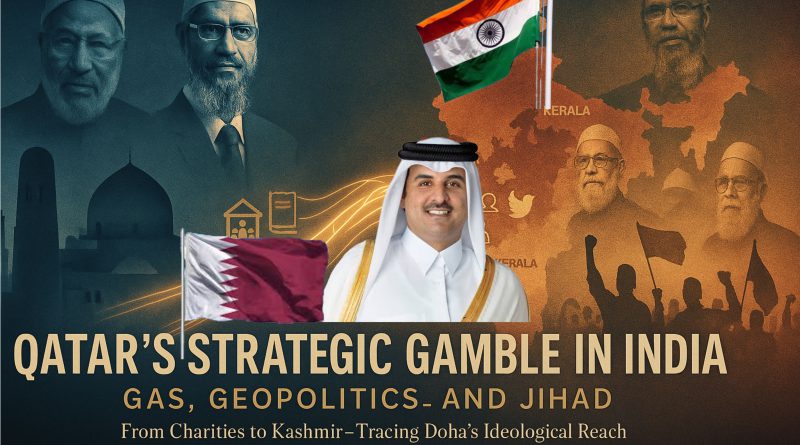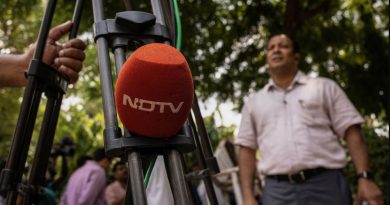Qatar’s Strategic Gamble in India: Gas, Geopolitics, and Jihad
Beyond direct funding of ideological groups, Qatar also employs media and diplomatic channels to shape narratives.
Despite being the world’s third-largest Muslim population, India has traditionally focused its counter-radicalization efforts on neighboring Pakistan. But emerging evidence and expert analysis now suggest that India may be underestimating a more insidious threat — one stemming not from its western border, but from the Arabian Peninsula.
At the center of this growing concern is Qatar, a Gulf state with deep ties to Brotherhood-aligned Islamist movements and a history of controversial mediation with jihadist organizations.
Abhinav Pandya, founder and CEO of Usanas Foundation, an Indian foreign policy and security think tank, highlighted this threat in an article published by the Middle East Forum on April 28. According to Pandya, “Qatar takes advantage of New Delhi’s relative blind spot to its efforts to further radicalize millions of Indian Muslims,” even as Indian intelligence remains preoccupied with Pakistan’s jihadist outreach.
Qatar’s foreign policy has long included diplomatic and financial engagements with Islamist groups including the Muslim Brotherhood, the Taliban, Al-Nusra Front, and Hamas. These relationships, Pandya warns, now intersect with growing influence campaigns and ideological funding that extend into India’s social, religious, and political spheres.
Doha’s Brotherhood-Aligned Preachers Influence Indian Muslims
The ideological influence of Qatar-based hardline clerics continues to echo across India’s Muslim landscape. The late Yusuf al-Qaradawi, a prominent Brotherhood-aligned preacher and Doha resident, remains a revered figure among Indian Islamist networks.
In India, Yusuf al-Qaradawi is venerated by influential Islamist figures such as Salman Nadwi and the Jamaat-e-Islami, whose founder, Abul A’la Maududi’s funeral prayers were led by Qaradawi—highlighting the enduring ideological affinity between Indian Islamist groups and the Brotherhood’s intellectual legacy.
Following the Indian government’s 2019 revocation of Article 370 — which ended Kashmir’s semi-autonomous status — Doha appeared to intensify its outreach toward Brotherhood-affiliated circles within the Valley.
In 2023, Qatar extended a platform to Zakir Naik, a controversial Indian Islamist televangelist, by hosting him at Expo 2023 in Doha. Naik’s enduring popularity in Kashmir is seen by security analysts as a bellwether of deepening radicalization among segments of Kashmiri youth. His sermons, authorities allege, inspired several extremists, including those behind the 2016 ISIS attack in Dhaka and a key Islamic State recruiter from Hyderabad.
Brotherhood-Linked Charity Under Scrutiny
One of the key actors in this alleged radical network is the Sheikh Eid Bin Mohammad Al Thani Charitable Association, commonly known as the Eid Charity. Leaked documents and past designations by U.S. authorities shed light on its activities. In 2013, the U.S. Treasury labeled Abd al-Rahmani al-Nu’aymi — a co-founder of the Eid Charity — a “Specially Designated Global Terrorist” for funding al-Qaeda affiliates across Syria, Yemen, Somalia, and Iraq.
Between 2008 and 2017, Eid Charity reportedly funneled approximately $7.82 million to eight Brotherhood-aligned organizations in India. These funds were allegedly used to construct mosques and promote conservative ideologies, including anti-secular, anti-modernist interpretations of Islam that critics link to radicalization.
Kerala: A Nexus of Radicalization
Pandya draws particular attention to Kerala, a state in southern India that has emerged as a hub for radical Islamist activities. Qatari foundations, including Sheikh Thani Ibn Abdullah for Humanitarian Services — a funder previously linked to the Nusra Front — provided $4.9 million to the Salafi Charitable Trust Narikkuni.
The Trust’s leader, Hussain Madavoor, is said to maintain close ties with Melevettil Muhammad Akbar, a controversial preacher known for recruiting vulnerable youth into extremist ideologies. Akbar’s Peace Foundation was once home to Abdul Rashid Abdullah, a Kerala native who later rose to lead the Islamic State’s Khorasan Province cell in India. Several Indian ISIS recruits had connections to this organization.
In 2018, Akbar was arrested at Hyderabad airport following a lookout notice from Kerala police for his alleged role in radicalizing schoolchildren. He was reportedly trying to flee to Qatar at the time of his arrest.
Other Brotherhood-linked institutions in Kerala receiving Qatari funds include the Philanthropic Society, the Symposium Education Charitable Society, and the Peace Educational Center.
Qatar’s Soft Power Push
Beyond direct funding of ideological groups, Qatar also employs media and diplomatic channels to shape narratives. Al Jazeera, the Doha-based news outlet, has frequently drawn criticism in India for what government officials describe as “anti-India” coverage — particularly on human rights, minority treatment, and religious freedom.
Qatari influence was also apparent during the fallout from a 2022 controversy involving Bharatiya Janata Party spokesperson Nupur Sharma, who was accused of making offensive remarks about the Prophet Muhammad on a television show. According to reports, Qatar summoned the Indian ambassador and demanded an official apology. Meanwhile, Qatari-based social media accounts were central in orchestrating the #BoycottIndia campaign online, pushing claims of a “Muslim genocide” in India.
The online campaign translated into street violence in India. Islamist protesters organized demonstrations in several cities, and multiple incidents of mob violence against Hindus were reported, particularly targeting individuals who had expressed support for Sharma on social media.
Electoral Interference and Foreign Funds
Pandya’s article also notes instances where Qatari actors allegedly attempted to interfere in Indian domestic politics.
During the 2019 state elections in West Bengal, a Qatari lawyer reportedly transferred funds to a regional political party with known Islamist sympathies and links to extremist groups. Indian authorities have yet to officially comment on these claims, but intelligence officials have expressed growing concern over external financial meddling in electoral processes.
Strategic Contradictions
Despite these serious allegations, India’s formal relations with Qatar remain strong. Qatar is India’s largest supplier of natural gas, and its sovereign wealth fund holds investments worth approximately $1.5 billion in the country. In February 2025, Indian Prime Minister Narendra Modi broke protocol to personally receive the Emir of Qatar during a state visit, during which the two nations elevated their bilateral relationship to a “Strategic Partnership.”
This warm diplomatic engagement, however, has not silenced national security experts who warn that Qatar’s covert activities — particularly its ideological funding and media influence — risk deepening communal polarization in India.
“Diplomatic niceties cannot mask the fact that Qatar’s Brotherhood-linked ecosystem is actively fanning extremism in India,” Pandya concludes.
As India navigates the delicate balance between energy security, trade, and national security, analysts argue that turning a blind eye to foreign radical networks operating within its borders may come at a long-term cost — one that could deepen internal fault lines and compromise democratic stability.



